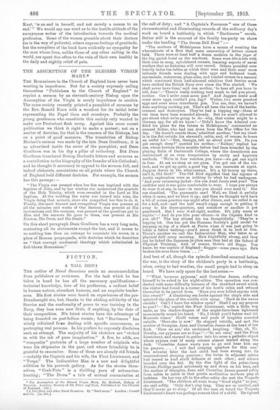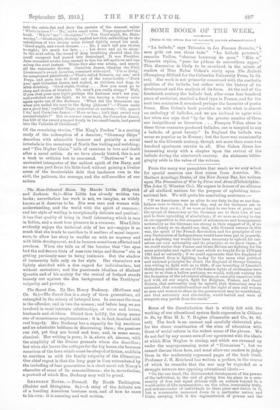FICTION.
A TALL SHIP.t
THE author of Naval Occasions needs no recommendation from publishers or reviewers. For the task which he has taken in hand he has all the necessary qualifications— technical knowledge, love of his profession, a radiant belief in human nature, abundant humour, and an exquisite tender- ness. His first stories were based on experiences of the pre- Dreadnought era, but, thanks to the abiding solidarity of the Service and the conformity of peace to war training in the Navy, they lose even now little, if anything, by the date of their composition. His latest stories have the advantage of being founded on post-bellum. events ; but " Baal:mug " has wisely refrained from dealing with specific occurrences, or portraying real persons. In his preface he expressly disclaims such an attempt. The majority of his sketches are "etched in with the ink of pure imagination." A few, he adda, are "composite" portraits of a large number of originals who were his shipmates in the past, and whose friendship he is grateful to remember. Some of these are already old friends —notably the Captain and his wife, the First Lieutenant, and " Torps." The Indiarubber Man is a new and delightful addition to his portrait gallery. As for the stories them- selves, " Crab-Pots " is a thrilling yarn of submarine- hunting ; "The Drum" a tale of mutual renunciation at
• The A.,sumption of the Blessed Virgin Mary. By Herbert, Bishop of Norwich. London: Society of SS. Peter and Paul, Publishers to the Church
of England. pd.]
t A Tall Ship, and other Naval Occasions. By "Bartimous." London Cassell and Co. [la. net.)
the call of duty ; and "A Captain's Forenoon " one of those circumstantial and illuminating records of the ordinary day's work on board a battleship in which " Bartimeus " excels. Better still is the account of the family tea-party on shore under the heading " The Seven-Bell Boat "
"The mothers of Midshipmen have a means of scenting the whereabouts of a fleet that mere censorship of letters cannot balk. There were at least half a dozen mothers in the foyer of the big, garish hotel on the sea-front. Some were tote-bAgte with their, sons in snug, upholstered corners, learning aspects of naval warfare that no historian will over record. Others presided over heavily laden tea-tables at which their sons and their sons' more intimate friends were dealing with eggs and buttered toast, marmalade, watercress, plum-cake, and toasted scones in a manner which convinced their half-alarmed relatives that famine must have stalked the British Navy ever since the War started. We shall never have time,' said one mother, 'to hear all you have to tell, dear.'—"There's really nothing very much to tell you about, mother. Can I order acme more jam P And Jagger. could scoff some more eggs, couldn't you, Jag P Waiter, two more poached eggs and some more strawberry jam. You see, dear, we haven't done anything exciting yet. That's all been the luck of the battle- cruisers and destroyers. They've had a topping rag—three of our term have been wounded' already. But we aren't allowed to gas about what we're going to do—why, that waiter might be a German spy, for all we know.'—' Didn't know the Admiral con- fided his plans for the future to Midshipmen,' commented an amused father, who had run down from the War Office for the day. 'He doesn't confide them,' admitted another, 'but my chest is in the flat outside his steward's cabin, and, of course, he hears an awful lot.'—' But, Georgia, tell us about your life. De you get enough sleep P' queried his mother.—' Rather,' replied her son, whose horizon three months before had been bounded by the playing fields of Dartmouth College, where the dormitories are maintained at an even temperature by costly and hygienic methods. We're in four watches, you know—we get one night in four. At sea we sleep at our guns. I've got one of the six- inch, and we get up quite a good fag in our casemate at night. Daggers dosses in the after-control. It's a bit breezy up there, isn t it, Old Bird ?' The Old Bird signified that the rigours of Arctic exploration were as nothing to what he had undergone. 'And your swimming-jacket—the one Aunt Jessie sent you P The outfitter said it was quite comfortable to wear. I hope you always do wear it at sea, in case—in case you should ever need it,' Her son chuckled. 'The pneumatic one P Well, we liked it awfully when it came, and we blew it up ; and then we thought we'd have a bit of scrum practice one night after dinner, and we rolled it up for a ball, and—and the half wasn't nippy enough in getting it away to the three-quarters, and somehow or another it got punctured. But I wear it all right, mother. It's jolly warm at nights.'—' And do you like your officers—is the Captain kind to you all P ' The boy stirred his tea thoughtfully. ' They're a topping lot. One has got the Humane Sodiety's gold modal for jumping on top of a 'shark at Perim when it was just going to collar a fellow bathing—you'd never think it to look at him. There's another we call the Indiarubber Man, who takes us at physical drill every morning. He's frightfully strong, and they say he licked the Japanese ju-jitsu man they had at the School of Physical Training. And, of course, there's old Beggs. You know, he was captain of England—Rugger—some years ago. He's broken his nose three times. . .
And best of all, though the episode described occurred before the war, is the story of the children's party in a battleship, when, owing to bad weather, the small people had to sleep on board. We have only space for the last scene:—
" What 'normous pyjamas,' said Cornelius James, suffering himself to be robed in his night-attire. The operation was con- ducted with some difficulty because of the sheathed sword which the visitor had found in a corner of his host's cabin and refused thereafter to be parted from. Have you ever killed anyone with this sword P' A blustering sea broke against the ship's side and splashed the glass of the scuttle with spray. Hark at the waves outside 1 Can't I have the window open P Shall I say my prayers to you P'—' No,' replied the First Lieutenant, with a little wry smile, as the shadow-fingers of the might-have-been tightened momentarily round his heart. 'No, I think you'd better wait till Mummie comes.' Shrill voices and peals of laughter sounded outside. 'Here she is now.' He stepped outside, and met the mother of Georgina, Jane, and Cornelius James at the head of her flock. 'Here we are,' she exclaimed, laughing. But, oh, Mr. Hornby, our pyjamas are so hues / '—' So are ours,' said the First Lieutenant, and stooped to gather into his arms a pathetic object whose pyjama coat of many colours almost trailed along the deck. Cornelius James wants you to go and hear him say his prayers. . . . I will find sleeping quarters for this one,' Ten minutes later the last child had been swung into its unaccustomed sleeping quarters ; the twins in adjacent cabins had ceased to hurl shrill defiance at each other ; and silence brooded over the flat. By the dim light of the police-lamp Private Phillips paced noiselessly up and down on his beat, and the mother of Georgina, Jane, and Cornelius James passed softly from cabin to cabin in that gentle meditation mothers play at bedtime. On her way aft to the after-cabin she met the Torpedo Lieutenant. The children all want to say "Good night " to you,' she said softly. Only don't stay long. They are so excited, and they'll never go to sleep.' Of all the men on board the Torpedo Lieutenant's heart was perhaps nearest that of a child, He tiptoed
into the cabin-fiat and drew the curtain of the nearest cabin' ' Who's in hero ? Me,' said a small voice. Torps approached the bunk. Who's "me"—Georgina? Yes. Good-night, Mr. Main-
waring.'—' Good-night, shrimp,' replied her idol, submitting to the valediction of two skinny arms twined tightly round his neck. 'Good-night, and sweet dreams. . . No, I can't tell you stories to-night; it's much too late. . . Lie down and go to sleep.' In the next cabin, the sound of deep breathing showed that the small occupant had passed into dreamland. It was Freckles. Jane remained awake long enough to kiss his left eyebrow and was asleep the next instant. White Bow also was asleep, and nearly all the remainder drowsy. Cornelius James, 'clasping the First Lieutenant's sword, however, remained wide-eyed, 'I'm so &sty,' he complained plaintively.—`That's called Nemesis, my son,' said Forps, and gave him to drink out of the water-bottle.—' Fank you,' said Cornelius James, and sighed, as children and dogs do after drinking. Good night, Corney. . Now you must go to sleep and dream of bloaters. Oh, aren't you really sleepy P
if you shut your eyes tight perhaps the dustman won't see you,' and switched out the light. As he was leaving a drowsy voice again spoke out of the darkness. ' What did the Buccaneer say when you nailed his nose to the flying jibboom? Please make me a good boy,' replied Tarps, somewhat at random.—' Oh, same's I do,' said Cornelius James.—' More or less ; isn't that sword very uncomfortable P' But no answer came back, for Cornelius James, the hilt of the sword grasped firmly in two small hands, had passed into the Valhalla of Childhood."
Of the remaining stories, "The King's Pardon" is a moving
study of the redemption of a deserter; "Chummy Ships" describes with admirable humour and geniality a social interlude in the monotony of North Sea waiting and watching; and "The Higher Claim" tells of reunions in love and death after a naval action. As we have already hinted, this is not a book to criticize but to commend. " Bartimeus" is an unrivalled interpreter of the noblest spirit of the Navy, and no one can part from his little book without gaining a livelier sense of the incalculable debt that landsmen owe to the skill, the patience, the courage, and the self-sacrifice of our sailors.



































 Previous page
Previous page